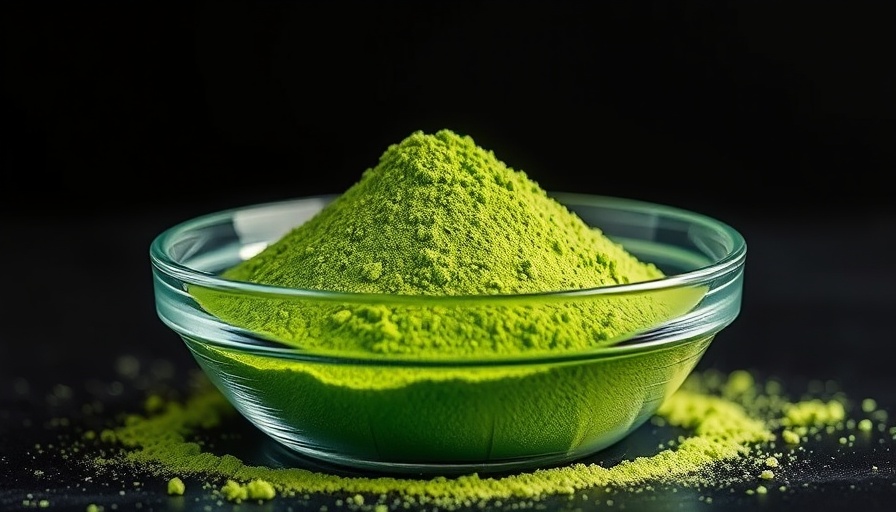
Uncovering Protein Power: Foods to Help Prevent Muscle Loss
As you age, maintaining muscle mass becomes increasingly important. After the age of 60, many individuals experience a natural decline in muscle, leading to weaknesses that can affect mobility and independence. The good news is, with the right dietary choices, it's possible to reduce the risk of muscle loss effectively. In this article, we'll explore remarkable foods—with protein content exceeding that of eggs—that can significantly contribute to muscle health and vitality.
In "This Food Has More Protein Than Eggs - Prevent Muscle Loss In Seniors," the discussion dives into essential dietary choices for maintaining strength as you age, exploring key insights that sparked a deeper analysis on our end.
Understanding the Significance of Protein for Seniors
For most, eggs have long been viewed as the hallmark protein choice, boasting approximately 13 grams of protein per 100 grams. However, for those looking to maintain or improve muscle strength, there are several other extraordinary options available. Protein is essential not just for muscle building but for repairing tissues, producing hormones, and supporting the immune system, especially as one ages. Therefore, incorporating protein-rich foods can empower seniors to live more active and independent lives.
Discovering Surprising Protein Sources
In the video "This Food Has More Protein Than Eggs - Prevent Muscle Loss In Seniors," we learn about ten surprising foods that can outdo eggs in protein content. Here’s a closer look at a few noteworthy options:
1. Greek Yogurt: A Creamy Protein Source
Plain non-fat Greek yogurt is a fantastic source of protein, offering over 10 grams per 100 grams. Beyond its protein content, it supports muscle strength and digestion, making it particularly beneficial for seniors. Easy to incorporate into meals, it can be blended into smoothies or mixed into dips for nutritious snacking.
2. Chickpeas: The Mighty Legume
Cooked chickpeas deliver about 11.5 grams of protein per 100 grams. Rich in fiber, they help maintain stable blood sugar levels while supporting overall digestive health. Studies have shown that substituting animal proteins with legumes can significantly reduce muscle loss in older adults.
3. Quinoa: The Complete Protein
Quinoa, often termed a superfood, packs around 14 grams of protein per 100 grams and is a complete protein source, containing all nine essential amino acids. This nutrient nature strengthens muscle tissue and promotes healthy aging.
The Power of Plant-Based Proteins
Notably, many of these protein-rich foods come from plant sources. As more individuals embrace vegetarian and vegan lifestyles, they may be surprised to find that complete proteins are not limited to animal products.
Health Benefits Beyond Protein
Besides being protein-rich, many of these foods—like pumpkin seeds and tempeh—offer additional health benefits including anti-inflammatory properties that can help preserve muscle and joint health.
Practical Tips for Implementing These Foods
Integrating these foods into your diet does not need to be complex. Consider starting your day with a smoothie featuring Greek yogurt, blending in some spinach and banana for added nutrition. For lunch, toss chickpeas into a salad for added texture and a protein boost. As for snacks, pumpkin seeds or a bit of Parmesan can easily enhance meals.
How to Enhance Nutritional Absorption
Soaking seeds and grains, including chickpeas and quinoa, before cooking can enhance their digestibility, allowing your body to absorb nutrients more effectively. Coupling certain foods, like vitamin C-rich vegetables with iron sources like tempeh, can also improve overall nutritional uptake.
Ready to Strengthen Your Diet?
As we grasp the significance of optimal nutrition for muscle health, it's time to take action. Consider gradually introducing these protein-rich foods into your meals this week. By making simple adjustments, you'll not only feel stronger and more energized, but armed with the knowledge of how to protect your muscle health for years to come.
By prioritizing nutrient-dense foods, you can take control of your health, ensuring that you stay active, independent, and vibrant well into your later years. Let's start this health journey together—your future self will thank you!
 Add Row
Add Row  Add
Add 




Write A Comment